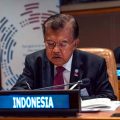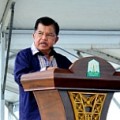Excellencies Head of Delegation of the Second Indian Ocean Rim Association Ministerial Blue Economy Conference,
Excellencies Head of Delegation of Dialogue Partners and International Organisation,
Honorable Secretary General of the Indian Ocean Rim Association,
Coordinating Minister for Maritime Affairs,
Ministers of Working Cabinet,
Distinguished Delegates,
Ladies and Gentlemen,
Assalaamu’alaikum Warahmatullahi Wabarakatuh
Good morning.
Firstly, I would like to welcome you to Jakarta. It is truly an honour for us to host the Second IORA Ministerial Blue Economy Conference, after hosted the IORA’s Summit in March.
The Leaders of IORA’s member states has adopted the Jakarta Concord which serves as a guideline to strengthen and enhance partnership in IORA, in creating a region of peaceful, stable and prosper in the Indian Ocean Rim.
We have also observed the adoption of the Jakarta Declaration on Blue Economy during the Ministerial Conference as a guideline in developing and implementing blue economy approaches to support sustainable development and socio-economic benefits for coastal communities in the Indian Ocean Rim region.
Blue Economy is a systemic approach aims to foster blue growth by upholding the environmental sustainability and social inclusion. In particular, elaboration on various undeveloped areas such as maritime tourism, involvement of private sectors in infrastructure, port network, financial inclusion, and the threat of marine plastic debris should be further explored.
The implementation of Blue Economy to catalyze ocean-driven economic growth is directly-linked to threats, challenges and opportunities in the Indian Ocean, especially to human wellbeing and livelihood of coastal communities, namely food security and maritime security.
We recognize that issues related to the ocean and its social aspects are clearly linked, inter-related and need to be considered in a comprehensive and holistic manner.
Distinguished Delegates,
Ladies and Gentlemen,
Seas and oceans are our future. More than three billions people in the world depend on the marine and coastal biodiversity as their source of lives. Ocean becomes the biggest world protein source; more than three billion people of the world depend on the ocean as their main protein source. Ocean becomes workplaces, directly or indirectly for more than 200 million world inhabitants. However, 40% of our oceans are affected by human activities including marine pollution, the depletion of fish-catching and the disappearance of coastal habitat.
The Indian Ocean has immensely vast resources which need to be explored and tapped for the benefit of our communities. The total intra trade amount of IORA member states is US$ 926 billion. The amount of total fish-catching in the Indian Ocean is approximately 13 million per year. However, that amount only represents 13% from the total fish-catching globally. Meanwhile, more than 40% of fishermen in the world live in this region.
In accordance with the Sustainable Development Goals, we need to emphasize that Illegal, Unreported and Unregulated Fishing is a form of transnational organized crime in which the international communities need to pay full attention to. In preventing and combating IUU Fishing, we encourage the establishment and the implementation of the international/regional law instrument.
As a country situated in the Indian Ocean Rim and as an archipelagic country united by seas, therefore Indonesia commits to awake our maritime spirit. In accordance with these commitments, first, we shall manage our maritime resources in sustainable way. Second, we shall build and develop our maritime infrastructure and connectivity. Third, Indonesia shall foster maritime diplomacy and defense.
Hence, the maritime vision is essential and indispensable for our nation. This maritime vision is translated into Indonesian vision as the Axis of Global Maritime, that is Indonesia as an independent, advance, and robust maritime country; and able to contribute positively for the regional and global security and peace.
At the national level, Indonesia commits to implement the blue economy approach, which operates on several principles namely creativity, innovation, and utilizing local resources and materials with the aim of reducing waste, in our endeavors for a better management of resources in the future.
Indonesia also commits to combat marine plastic debris. We have the goal to reduce plastic debris to 70% until 2025.
Our maritime economy in the future lies in the blue economy. The challenges of the Blue Economy concept are indeed rest on business and industrial sectors amid all the more limited resources. We need to respond these challenges together, particularly the government in facilitating business and industrial sectors that commit to implement this concept in the future.
For that reason, I highly appreciate voluntary commitments both from the member states and dialogue partners as well, to contribute to the implementation of blue economy fund commitment, that is the core theme of this Ministerial Conference.
By saying Bismillahirahmanirrahim, I officially open the Second IORA Ministerial Blue Economy Conference.
Thank you
Wassalamu’alaikum Warahmatullahi Wabarakatuh.






